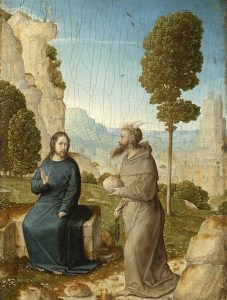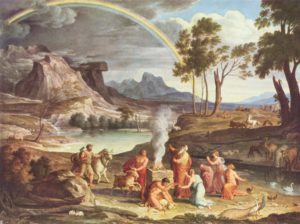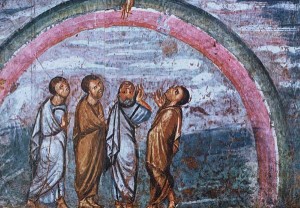Thoughts on Sunday’s Lessons for Feb. 19, 2024 (Lent 1B)

Jesus and the Tempter (c.1500), oil painting on panel by Juan de Flandes (c.1465-1519). National Gallery of Art, Washington, D.C. (Click image to enlarge.)
First Reading: Genesis 9:8-17
God makes a covenant with Noah, promising never again to destroy all human and animal life in a vast flood, and placing a rainbow in the sky as a vivid reminder of this agreement. As Lent begins, our Lectionary readings for the season start with this, the first in a series of covenants that God will make with leading figures in the Hebrew Bible’s ancestral stories. These are binding agreements between God and the people; agreements that the prophets will hold up as the standard by which the people must live in order to inherit the Kingdom.
Psalm: Psalm 25:1-9
This Psalm of praise, one of many that tradition attributes to the hand of King David himself, asks for deliverance and protection from enemies and scheming foes. This is a recurring plea in the Psalms, one that may reflect ancient Israel’s hard-won status as a tiny nation surrounded by foes. As we sing this Psalm, we express the joy of holding up our hearts and souls with willing trust in God’s compassion and love. Even in the face of triumphant enemies, the Psalmist sings of praise, not fear, and the hope of God’s faithfulness to those who have made covenant to follow God’s ways.
Second Reading: 1 Peter 3:18-22
In this short passage from the first letter of Peter, the author builds on the themes of the first reading and psalm. The author reminds the people that they are now saved in the water of baptism, just as Noah and his family were saved in a world covered by water. Both saving acts are the work of God, but baptism is no mere bath that washes away dirt. It is, rather, an appeal to God – like a covenant – that provides a new beginning through the resurrection of Jesus, who now sits at God’s right hand as lord of all creation.
Gospel: Mark 1:9-15
“You are my Son, the Beloved; with you I am well pleased.” How many times recently have we heard these booming words from above? We heard them in Mark’s account of Jesus’s baptism at the beginning of Advent and again at the beginning of Epiphany. We heard them again last Sunday at the Transfiguration. And now here we are again as Lent begins. As we move from the Incarnation toward the Cross and the empty tomb, we repeatedly remember God’s declaration. Now we move on from the baptism scene to hear of Jesus’s temptation in the desert. Then, in Galilee after Herod has arrested John, Jesus begins proclaiming the Gospel in Galilee: “The time is fulfilled, and the kingdom of God has come near; repent, and believe in the good news.”



